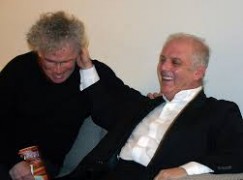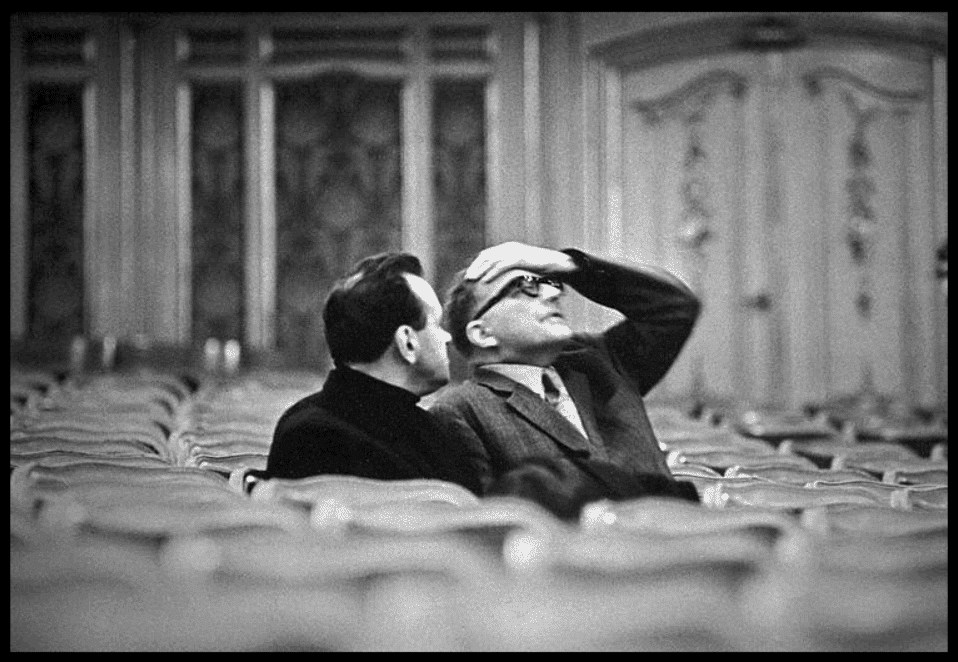How modern maestros changed their manners
mainIn the new issue of the Spectator, I have written – with reference to Daniel Barenboim – about the way conductors have evolved from tyrants to man-managers.
Barenboim’s generation replaced dictatorial terror with mental pressure. The genial Claudio Abbado would say nothing in rehearsal but, as he left, would drop a name in the manager’s ear and a certain musician would be de-rostered for his next visit. Zubin Mehta, unfailingly agreeable and workmanlike, used orchestra managers as his hatchet men.
Read on here.






Mr. Lebrecht: this a very interesting article aside, where is the report on your 45′ interview with Barenboim?
It was a radio interview.
Link?
Thank you for this article Norman! Sincere and factual.
(yeah, yeah, haters, have at me)
They say you should never meet your heros, and indeed it was terribly disappointing to personally meet both Rattle and Baremboim on several occasions and find out how horrible they could be as far as common decency goes. At least Barenboim never really gave the appearance of being friendly, but Rattle’s fake smile is even more disheartening when he smiles to your face and backstabs you a moment later. Sure, maybe just my personal experience, but from what I know first-hand it would be impossible for this to be an isolated case.
Spot. Rattle was fake smiling emptiness, and Barenboim real–no fake smiling or happy talk. Sandra Dackow polite demanding during rehearsals, yet off stage, had the manager put folks on ‘the list.’ And then Ric Madru, tough as nails, and if certain benefactors gave lots of donations/funds, magically, the musician stayed. Toxic orchestral music ‘leaders’.
Rattle: vastly overrated in England; pretty much rated accurately throughout the rest of the world.
Is that why Rattle was invited to become conductor of Berlin Philharmonic?
I can fully confirm the case with Rattle whom I met once and knew for sure I would not for the world want to repeat the experience.
Interesting all these tidbits about Rattle. He comes across as so genial and easy-going in various interviews and documentaries I’ve seen!
Just goes to show that I guess you can’t trust the public face that so many famous figures project to the world.
The classical music world consists of two halves: 1) the exterior façade, which is a smoothly run, polite and highbrow art machine, and 2) the highly-strung interior which is a snake pit and a shark pond combined. It attracts great talent and nasty characters. But it is entirely understandable why this is so:
http://subterraneanreview.blogspot.com/2017/08/orchestral-erosion.html
I agree with your comments. The problem is too much ego and too little empathy. I think music needs more of the latter. So often what we hear is chiefly ego. Perhaps the core of the problem is that a massive ego seems a prerequisite for massive success; the two feed on each other, and the results are ugly.
I was pretty taken aback by the title of the article, ‘The Fall of Barenboim.’ He hasn’t exactly ‘fallen’ just become another casualty of the ‘victim’ mentality that has now become fashionable.
We’re taken aback by Claudio Abbado–the seemingly affable, ‘quiet’ sweet man, yet, well known abt whispering a lil’ something in the ear of that hatchet man manager, and that musician was gonzo. Another faker, passive aggressive nonsense, and player in the land of music orchestral. Why not be a man/woman and have the integrity to tell the musician to his/her face that they are no longer needed. Spineless jellyfish yet the external appearances are smiles, fake politeness, and a whole lotta nothin.’
I wondered about that title too – maybe it was a deliberate multilingual pun. One way of saying the Barenboim affair in German would be der Barenboim-Fall
In German syntax: Der Fall Barenboim
None of the above could have held a candle to the likes of Klemperer, Furtwängler, Kleiber, Toscanini etc etc…
Ps: Carlos Kleiber referred to Zubin Mehta as a benighted thug
(Corresponding with Carlos: a biography of Carlos Kleiber by Charles Frederick Barber).
Barenboim, in my not so humble opinion, never rises above the average as a conductor and the mediocre as a pianist.
Frederick Fennell–excellent conductor, yet b/c he does concert band music, they poo poo’d him. Sad. b/c most of these fakers (smiley Rattles, and the American-Mexican girl w/hip gyrations) cannot hold a candle to him.
Thank heaven I’m not alone in my opinion!
==Simon Rattle has made lists of musicians he would like to see pensioned off.
Blimey. I remember when Mark Elder became head of ENO ( I think it was the same day Margaret Thatcher became PM ) he subtly gave a number of orchestral players their marching orders.
Let’s hope a bit of time before he starts on the LSO.
It was a few months later and he became known as the ayatollah of st martins lane
well, that article took a strange turn at the end
Awesome. Finally somebody talks about the side of Abbado behind the scene.
Norman Lebrecht touched upon that in his 1991 book The Maestro Myth.
As long as conductors (maestros) get treated like gods from managements and as long they earn way to much money for what they are doing, nothing will change. There might be exeptions!
Orchestras all over the world: UNITE
Don’t let a single person decide what is right/wrong, good/bad
Teach all the ”maestros” to treat musicians with respect!
Let’s face it: Noone can hear the sound of conducting
Agree with your opening, that conductors are treated too much like demi-gods. But it’s not only the management and agent’s fault. Too many musicians do check their sense of responsibility at the stage door and actually enjoy submitting to a father figure on the podium. Life is easier that way. Always someone to blame, if things don’t work out ideally.
Disagree with your last sentence. Conductors do make a difference to the sound of an orchestra. Their breathing, their ‘energy’, their posture, it all has an effect on the sensible musicians. That’s their direct or immediate effect. There is also the indirect one, what they achieve through rehearsing.
Also an orchestra only functions with a certain hierarchy. There must be someone to decide, have the final say. Otherwise it gets very inefficient.
Even the conductorless chamber ensembles have hierarchy.
Nonsense. An orchestral performance is the result of the conductor’s work, he/she has to get all the different players with their different instruments together to get the score sounding. An orchestra without a conductor isn’t an orchestra. The full responsibility of how an orchestra sounds, is in the hands of the conductor.
Orchestra musician: And how many years have you played in an orchestra?
…You know, without “odious past authorities” like Toscanini, Stokowski, Reiner, Koussevitzky, Rodzinski, Szell, Klemperer, Beecham, Karajan, Celibidache, Böhm, Leinsdorf, Solti, Mravinsky and a very long etcetera, there would not have been anything close to the degree of excellence and prestige you might enjoy today and take for granted.
Yes, there were exceptions: Furtwängler transformed the sound of the orchestra with only his presence, Bruno Walter’s “mild approach and friendliness” didn’t diminish his role as a “benign dictator”, one could say the same about the venerated Carlo Maria Giulini, who combined a saintly outlook while being completely uncompromising regarding authority – a lot like Abbado (the last great maestro closest to our days!), Carlos Kleiber’s mercurial personality bewitched the few orchestras he conducted – despite his plentiful talking and instructing, but it was his mesmerizing conducting style that brought the best out of the orchestra, aswell as his equally phenomenal way to explain the sound he wanted, and then there was Hans Knappertsbusch, who hated rehearsals, so the orchestra responded to his inspiring presence and his phenomenal mixture of control, spontaneity his knowledge and self-confidence.
And then there is Gergiev who is the real Zar of russian artistical politics, and of whom the Marinsky’s 4.000 enployees (or more) are depending on with their lives.
If you want to go back to the days where the orchestra depended on the concertmaster, be sure you have a real good and authoritarian one up there, and then I’ll say good luck with La Sacre de printemps, Varèse’s Amériques, Wagner’s Ring and Mooses und Aaron (!)
(Mooses und Aaron??? Maybe try ‘Moses und Aron’).
Jacking-me-off?! You know when your finger presses the same touch-key twice?
Cos that blinded you from getting the whole point, right you Smart-ass?…
#MeToo is non stop. Who will be the next one? You should have written your experience with Barenboim’s interview years years ago, but, we know, those were different times…
Democracy and professional manners are expanding in the classical music and that’s good news. Thanks Norman!
It’s an issue of authority. A good conductor does not need bad manners, bullying or backhand tricks to get what he wants from an orchestra: the authority of his musical vision and his technique should be enough to get the players along.
Or his sense of humour, as in the case of Colin Davis whom I heard tell the LSO: “Ladies and Gentleman, how can I possibly follow you if you insist on not playing together? “
Sometimes such notion can be taken too seriously, as with Bruckner when he conducted one of his symphonies for the first time with the VPO. He did not dare to begin and mumbled; ‘After you, gentlement.
Agreed. People are confusing the authority necessary to the conductor with the absence of basic manners in some of them who behave like demagogues. There’s no need the conductor to be rude and nasty. Orchestral musicians on this level are certainly not incompetent.
The Mourinho swipe toward the article’s end is simply not inaccurate and thus undermines the credibility of what comes before. Jose has never been known to be a screamer, and to say the media has gone light on him is laughable. Of course, Mourinho has been a magnet for criticism from supporters of other clubs ever since his huge success with Chelsea. So please fess up, Norman: Who’s your club, mate?
https://youtu.be/f5VF5LJs8uk
LOL
I seem to have included an Unintended NOT be the word inaccurate. Wish there was an edit button!:)
My (intended) post should read “… simply inaccurate and thus …”
Again I must ask: Could you please excise the word NOT before the word INACCURATE? It was a typo and alters my intended meaning. Thanks, Carl
What are Rattle and Barenboim next to Beethoven or Brahms?
Answer: very little.
Ultimately they are here-today-gone-tomorrow “recreators” and are nothing compared the composers whose masterpieces have enriched the lives of millions.
As such they are given far too much respect, power and attention.
>>next to Beethoven or Brahms?
Got me wondering. Barenboim studied for a while with Nadia Boulanger where as one of his activities he has to compose some works. I wonder if they were any good (probably not, as he’s never been afraid of blowing his own trumpet).
But the B’s are dead and the conductors still there. A wide-spread problem is that quite some performers see the pieces of the repertoire (the ‘canon’ ) not as works of art they have to serve as loyally as they can, but as mere vehicles for their own ego and vanity, as tools for their own ‘expressiveness’, which is the world upside-down. There are performers, and some of them belong/belonged to the Great and Famous, who secretly foster a deep contempt for the music on which they persue their career, fed by envy and frustration about their own creative limitations – flopped composers, say. They adore the score in the way a motor cyclist polishes his proud vehicle, as their possession, and try to decorate it with flimsy stuff as to make their thing different from other motorcyclists.
To paraphrase the master thespians, “Shouting is not leadership.”
Regarding the “thug” comment by Kleiber, the hate is understandable since Mehta’s career really took off during the late 60s when Kleibers’ was still stagnant…..
Ha ha. So you think Carlos actually wanted a career???
Sure he did. What he did not want, were his overbearing inner fear and complexes.
And this was the greatest sin of the intendants of Kleiber’s times. How did they not recognize Carlos’ talent?
Norman wrote: “managers like Jose Mourinho are spared the media heat that has been blasted at Barenboim”
Actually, Mourinho got fired from his last two jobs because of his treatment of his players, after a long series of press reports about his behaviour. And football clubs don’t bother with “notice” or “hearings”: he got immediately marched out of the door. If you spend £100 million on a player, you don’t want the coach to abuse them.
While Ferguson was famous for “the hairdryer” treatment of players, this seriously mis-represents how he behaved. Beckham, for instance, still views him as a father figure, despite being made to leave the club. Overwhelmingly, his players loved playing for him and really respected him, and even now will ask for his help and advice (which he gives freely and generously).
On Abbado/Rattle.
Actually, one of the tasks of the chief conductor is to evaluate the standard of playing of the musicians in the orchestra, and dealing with players who are performing poorly. This is a fairly horrible process however it is done, and very stressful for the musician involved. No conductor will last long in the job if he (or she) doesn’t find a way of ensuring the standard of playing is acceptable, and removing musicians whose playing is consistently not.